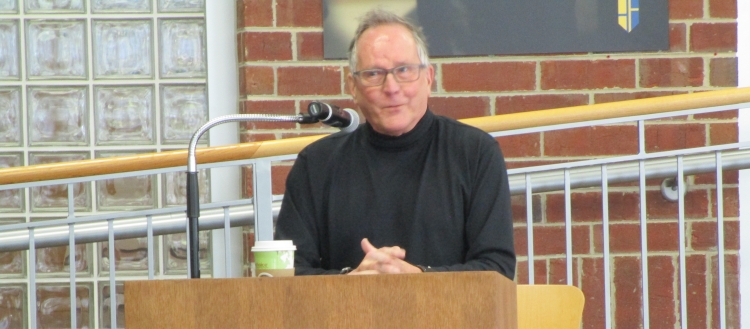Interviews
The following interview was conducted by Delonda Anderson, Chief Editor of Appalachia Bare, on November 8, 2021.
1.
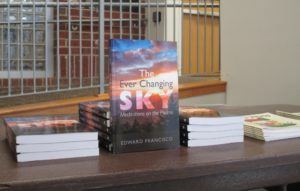 AB: You mentioned The Ever Changing Sky took over 10 years to write. Given that you’re a contemplative, deep thinker, what was the initial motivation for writing it?
AB: You mentioned The Ever Changing Sky took over 10 years to write. Given that you’re a contemplative, deep thinker, what was the initial motivation for writing it?
ED: My initial impulse was simply to meditate on the psalms in some way that they magnified or clarified events that were occurring in my life. I tried to see my events, my occurrences, whether they were with my family or friends or with my vocation in the light of something larger, and the psalms provided me with that lens for doing so.
I really began out of impulse a recognition that every moment of my life was important and that it was incumbent on me to be keenly aware, to bring mindfulness to every perception, observation, thought that I was having. And obviously I was trying to see the relationship between my present with the present of an earlier age, the ancient Israelites, who were a people despised, a people who were exiled, who were forced into remoteness, and at the same time were commanded to have hope and faith and obedience. Obedience was a very important part of the Jewish covenant with God. Their god promised that he will bless them so long as they observe the covenant, so I was trying to figure out what kind of covenantal relationship I had with various aspects of my life, my life as a husband, as a father, as a teacher, all of the obligations I sought to fulfill in middle age.
2.
AB: Do you have a favorite meditation of your own?
ED: The meditation on the bob white quail. Now, I love that one. I do. I think because it rose in my mind at least to the level of poetry. It was poetic. And I think it’s interesting that for years I taught Shakespeare and became acutely attuned to the rhythms and the music of Elizabethan English, of the King James Bible and its ultimate expression. And for me that particular meditation (I certainly didn’t intend for it to be.) sounds to me like the psalmist language translated in the King James Bible.
AB: That – honestly that meditation resonated with me too because I used to hear the bob white . . . But you recognize it when you hear it.
ED: Oh, you do, don’t you? And even as a child, it comforted me to hear it because there was something soporific about it. It lulled me to sleep. There was some presence out there that was alive but mysteriously hidden, that made it alright for me to sleep, not to indulge night terrors and fears of the dark.
3.
AB: What was the most difficult part of writing the book? I know you reached the 75th and decided, “I might as well . . .”
ED: Well, and I think that’s important. There were periods of malaise where I would forget about the meditations and just lived on, lived my ordinary life, and then something would tug me back and I would look at the meditations and see where I’d left off, and then picked up from there. I think one of the enemies of the spiritual life is acedia, the idea that you’ve reached a plateau, now where do I go from here?
You and I have talked about whether or not we really believe in God. Well, the philosopher Hannah Arendt talked about refined atheism – the idea that you do have to give up the old notions and the old assumptions about God, and really walk in the valley of the shadow. I can’t embrace God as anything but the Newmanist quality of awe. God is not my friend. God is not somebody who can be bribed. And that’s terrifying. It’s terrifying. And Arendt says it’s necessary to experience those, for lack of better words, bouts of atheism, where you don’t know you’re questioning. And that questioning is right and proper, no matter the outcome.
AB: Do you think that experiences lead you to that questioning – I guess roller-coaster kind of life – or do you think it’s the age you are?
ED: Well, it’s probably both. It’s a nexus of both. I think about Mother Teresa. Now, she’s been lauded and canonized, but she vocally admitted her lack of faith at the end of her life. She didn’t know anymore. That inability to know anymore may be a requisite of the journey. So, when you say, “I don’t know if I believe in God anymore,” or Linda says, “Why would God let my grandchild die?,” that agonizing wail, that howling into the wind that Job describes . . . 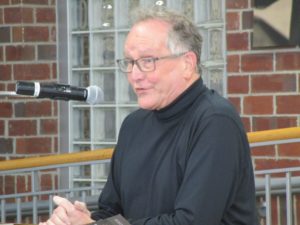 We have to remember Job lost all his children. And it’s interesting that when God gives everything back to Job tenfold, the one thing he doesn’t give is children ten-fold. Because you can’t do that. That’s another way of saying they’re irreplaceable. So he gets one for one. Job gets one for one. And at the core of my theology is what I said today when I was reading one of the meditations is that God has to suffer the way we do on the same terms with the same sacrifice or I’m not obliged to believe in his-slash-her existence.
We have to remember Job lost all his children. And it’s interesting that when God gives everything back to Job tenfold, the one thing he doesn’t give is children ten-fold. Because you can’t do that. That’s another way of saying they’re irreplaceable. So he gets one for one. Job gets one for one. And at the core of my theology is what I said today when I was reading one of the meditations is that God has to suffer the way we do on the same terms with the same sacrifice or I’m not obliged to believe in his-slash-her existence.
You know Carl Jung said that the book of Job forced God to see his backside. And I think Jung meant by that, that when God comes down and thunders, hast thou an arm like God? Didst thou make the sea serpents, and all of the other things. It’s a bluster. And, essentially, Job calls his hand and he says there can be no union between me and thee, given the difference in power that each of us has. So, God has to figure out a way to make the equation equivalent, and, at that moment, Jung says, Christ came into existence. It’s all the book of Job. And I see that. I think about. Is it okay if we just talk about–
Delonda: Yes.
ED: I think about the loss of your [son] Gabe and of you. And here Job is surrounded by the false comforters. The people who are saying that [your eldest son] Tré should be a funeral director. And Job pleads, saying, “have pity on me oh ye my friends for I have been touched by the hand (or the finger) of God.” And that’s what I felt when I saw you in that church. I thought there is an aura around her. It’s inviolable. Don’t even think you grasp, you understand. Don’t say anything. Because you don’t know. And you can never know. I’m always struck by that verse because it’s like – it has the emanation of radiation. Don’t get close.
Delonda: Yes. I could actually feel that around me, honestly.
ED: I mean, I knew. What struck me about it was how glad [your husband] Tom was to see me. Because I think he knew I wouldn’t violate that, but I would love you with that.
Do you remember what you did? You did what women at the wailing wall did. You cut your hair.
Delonda: Yes, I did.
ED: That’s symbolic. I mean, at that moment you were unmothered. I don’t know any other way to say it. But that’s what women did in ancient times when they lost a child, went to the wailing wall and cut their hair. You were doing something instinctive and archetypal, and primitive, because at that point, the rational dissolves.
4.
AB: What do you hope readers will take away from The Ever Changing Sky?
ED: I want the book to align with their journey toward authenticity, to ask the ultimate question, to not be afraid to ask those questions, in the light of the questions I’ve asked. It’s not a book of how-to devotions, as I’ve indicated today. I want it to resonate with people on a human and spiritual and existential level. It’s not for people who don’t want to be aware. I just want to be able to contribute to people’s trek toward awareness. I have no more ambitions for the book than that. I certainly didn’t write it – I wasn’t trying to imitate anybody. I wasn’t trying to imitate Augustine’s Confessions, or Thomas Merton’s The Seven Storey Mountain, although I certainly have read those texts and I’ve been influenced by everything I’ve ever read, and everything I’ve experienced, and everything I’ve taught.
One of the premier experiences and challenges for me was a course I taught at Pellissippi in the special topics program of that time called “Christology: Images of Jesus.” And I sought to seek Jesus out in as many manifestations as I could for the people in that class, and for them to do the same. Now, I ran into trouble because the fundamentalists met at my office to cajole me and to chastise me. One actually told me, “I’m not naïve. I’ve been to UT.” To which I replied, “Neither am I. I taught at UT for ten years before I came here.” You know, he came to give me a hard time, but I remembered saying, “It’s obvious to me I have nothing to teach you. So let us part on good terms. I will send you on your way with all blessings.” And I thought he was going to step into his jaw. And he said, “You don’t want me to stay?” I said, “Oh, no, I don’t want you to stay. You don’t want to stay. Why would I want you to stay?”
At that time, we had more wiggle room to offer courses that were unconventional. I also taught a course called “The South in Literature and Film,” and used the anthology that Linda and Robert and I had edited for Prentiss Hall. The curriculum, of course, has become too cookie-cutter now. I couldn’t offer a course in Christology, if I were still teaching, if I wanted to.
I was a little worried today about the reading because I thought, “Okay, I’ve got some young people in here,” and I’m making no apologies about being a Christian Apologist. But they were fine with it, they really were. And I kept my eye on them. And that was one of the reasons why I said “You don’t have to be a purporting Christian to have Christ consciousness.” If I gave them a way to embrace their own inherent spirituality without forcing it on them, then I was successful.
5.
AB: What is the most surprising thing you’ve discovered about yourself while writing the book – or doing the readings?
ED: How much I don’t want to be perceived as holy or holier than thou. A saint is someone who is most fully him or herself. Now, to my thinking, that’s a superb definition. The saints were pretty irascible, ornery people, by and large. And if I can count myself in that group, okay, I’ll hold my nose and say, “Well maybe there’s some possibility of me being saintly in eons from now, okay?” But I discovered through grace, maybe a smidgen of humility, I think we all have to walk away at some point and say, “I’m not all that.” And I don’t want to be those people who are all that.
I offered the caveat that I’m neither as good nor as bad as the man who wrote these meditations. And I shiver at what people are going to think of me in some of them. The young woman who typed them originally, said to me, “You know what I like about these?” And I said, “No, what?” She said “You don’t try to explain yourself away. You’re just straightforward. You’re truthful about you.”
These psalms may have helped me to point to what I don’t want to be, and what I’m perfectly fine being quiet around. At this point in my life, I don’t have anything to prove. In the relatively small scheme of things, I’ve been successful. Everything I’ve attempted to do. For one of your former students to say, “You’re amazing,” that just lifts you up.
6.
AB: Did writing these meditations strengthen your own faith?
ED: Yes. I would say overall. There’s no way that you can’t meditate, and by meditate, I mean live with these. They are Divine writings that are humanly profane, and that nexus between the holy and the human is what I derived, I think, from writing these psalms. Being able to stand in that place.
You know, Keats talked about negative capability with regard to Shakespeare. It’s being able to stand in the midst of chaos and contradiction, he says, without reaching irritably after fact. And, to me, that’s being in the center of the spiritual swirl. Can you be quiet, pensive, centered, when all of that is swirling around you. And that was the benefit, again, the grace, I received from writing these. I am more centered, I think. I’m less judgmental. I’m more protean. I’m more accepting.
Now, there are some things I’m not going to accept. And that gets back to Jesus not liking the money lender and the bureaucrats, hating the hard-hearted and those who would extort and abuse children. You know, if you think every child is your child, it changes your whole perspective.
7.
AB: You’ve written novels, short stories, books of poetry, essays, plays, and have features in journalism. Did you find this endeavor differed from these genres? If so, how?
ED: No, and let me explain why. I’m a writer, and not a writer of . . . I know poets, for example, who can’t write prose. I know plenty of prose writers who’ve never attempted to write a poem. And a play is one of the most rarified writing assignments I’ve ever had, even as rewarding as it is when brilliant actors and directors take your work and fix it. It’s still overwhelming. So, I have enormous respect for playwrights. And, to be honest with you, there aren’t a lot of great plays.
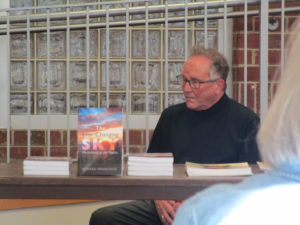 I’ve never niched myself. Now, people have niched me. Linda will tell you I’m a great poet, if not a great human being. And Gabriel will say, “Dad, your best genre is poetry.” But I think I’m a pretty damn good raconteur. I’m a good storyteller, whether it’s tall tales or mystery fiction, I enjoy it. The problem about writing poetry is that you’re only a poet when you’re writing a poem. All you want to do is finish the poem, get that monkey off your back, at which point you’re no longer a poet, and you sit and bite your fingernails, never knowing if the impulse will strike again or not. I was so – it was a leap of faith for me to write the Mabon poem.
I’ve never niched myself. Now, people have niched me. Linda will tell you I’m a great poet, if not a great human being. And Gabriel will say, “Dad, your best genre is poetry.” But I think I’m a pretty damn good raconteur. I’m a good storyteller, whether it’s tall tales or mystery fiction, I enjoy it. The problem about writing poetry is that you’re only a poet when you’re writing a poem. All you want to do is finish the poem, get that monkey off your back, at which point you’re no longer a poet, and you sit and bite your fingernails, never knowing if the impulse will strike again or not. I was so – it was a leap of faith for me to write the Mabon poem.
AB: I love it.
ED: Thank you. I said to myself “You’re being called to another level,” and I said, “I want to reach the atmospheric heights . . . of Yeats perched on the pinnacle.” You’re ready to tip one way or the other. It’s either a blow out or it’s going to be brilliant. And I think you were right. I think that poem is brilliant.
AB: It is . . . It seems to me with that poem, I mean when I listen to it, I close my eyes because it’s so . . . the imagery is sometimes overwhelming in a good way. So, I close my eyes and I envision all of it. And it seems to me like you were taken to another dimension.
ED: I was. And it was one with which I was unfamiliar. In other words, I wasn’t using the old tools that I know. Even the poem about Josh and about Henry. Those poems – I knew what I was doing, the same alliteration, the same rhythmic qualities, the short line free verse. It wasn’t that it didn’t challenge me to find the words, but this one is like okay here you go. Figure it out. I had no certainty about any of it.
AB: Also, you’ve been studying the Kabbalah for a very long time, and it kind of helps to understand that study has led you to this writing.
ED: It has. Do you remember, maybe you don’t, I was doing this study and have been doing it for a long time about initial consonant clusters . . .
AB: Yes, yes.
ED: David Brown [my colleague] called me one day and said “You’re already a Kabbalah master. You’re doing – what they did, you’re doing with that study of yours.” I thought, well, yeah, I kind of am. You know, you unlock the mystery with sound. And this poem that I read today, you look at it carefully. It’s a poem about sounds. Incantational sounds.
8.
AB: What do you consider the key theme or message from this book?
ED: I think it comes down to the last sentence that I wrote in the post face. About if you want to discover God, all you have to do is look at the kaleidoscopic flux, the change, and you’ve got to be willing to admit change no matter where you are in your life, of the ever changing sky. You have to embrace change without fear, without hesitation, without anxiety, and right now I’m resisting that change because my anxiety level shot up . . . because I am starting over, in essence. And if you let it get to you, that’s terrifying.
9.
AB: What, typically, is your writing process? Do you have a particular hour . . .
ED: I usually do. Now my schedule has changed a little bit owing to taking care of my grandson. I’m a morning writer. Typically, I write in the morning. If I’m writing prose, either fiction or nonfiction, I establish a word expectation for the day. If you’re looking at a novel, let’s say. If you write 350 words a day (and you count them out in the margin if you have to), you’ve got approximately one page of prose. Now, if you write 3,000 or 6,000, good day! But you never get up until you’ve finished 350 good words a day.
Afternoon and evening for me are revision. Go back, look at it. You’re much more rested, even soporific. And the unconscious works to help you. So, I’m a morning writer. I’m an afternoon reviser, and that’s pretty much been my pattern since I was twenty-four. I mean I’ve got the energy. It’s the cream of the day. Okay, so you get into that kind of liminal state where you’re between awake and tired, and you revise at that point.
AB: Do you have a certain amount of time that you revise or is it just . . .
ED: No, just what I was working on that day. Now, I try to write everything so that I get it right the first time, but you don’t – I don’t. So, I come back the next day, I look at it. I did that with that poem. And, revision is a tricky log jam thing. I’ve never just slobbered on the page. I’ve tried to get it right the first time, knowing I won’t get it right the first time.
10.
AB: What were some of the challenges you faced with the manuscript?
ED: That I had finished it on the cusp of the pandemic and the wheels of publishing stalled on the track. They were so slow responding and I was worried because I was trying to keep my contract deadline. Fortunately, my editor said don’t worry about it, they’re behind, too. And, as you know, the line editing, which you and Linda did so spectacularly was secondary to the formatting required. And you cracked that code. I don’t know how you did it.
Delonda: [Laughs] I don’t either. I did research, I think is what it was.
ED: You did. You always research which means your writing is always on solid ground. But you figured it out. I swear, if I had had to do this alone, it wouldn’t be out today. So, was that a challenge? Sure. Even though I had finished writing the book when the pandemic broke.
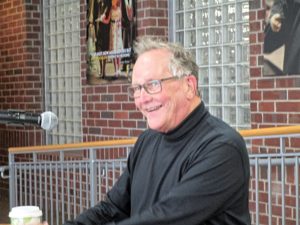 The other challenge, on a more mundane basis, was rearing a family, teaching classes, being a husband, doing chores, and finding time when I could. I’ve heard writers who’ve said, Walker Percy in particular, said “I’m amazed at gifted teachers who also write.” He said “I was a lousy teacher. I couldn’t teach and write.” But you know I always managed that pretty well. You know how I did that? I gave assignments to my students that I could dovetail into my own work. So, what I was asking my students to write was some facsimile of what I was writing at the time. So, when I gave an assignment to write “A Blank,” I wrote it, too. And that’s how I solved the problem, if there was one.
The other challenge, on a more mundane basis, was rearing a family, teaching classes, being a husband, doing chores, and finding time when I could. I’ve heard writers who’ve said, Walker Percy in particular, said “I’m amazed at gifted teachers who also write.” He said “I was a lousy teacher. I couldn’t teach and write.” But you know I always managed that pretty well. You know how I did that? I gave assignments to my students that I could dovetail into my own work. So, what I was asking my students to write was some facsimile of what I was writing at the time. So, when I gave an assignment to write “A Blank,” I wrote it, too. And that’s how I solved the problem, if there was one.
Percy said once again, “Writers go into a state. They orbit, within that hypercerebral state of being, but then they have to come down.” That’s very hard for writers. You orbit but you have to decelerate and come down. And that was never very hard for me. Now, how did Percy and Faulkner come down? They drank. For six weeks. You go out and you write The Sound and the Fury for six weeks of sobriety, or relative sobriety, then you go on a binge for six weeks, because you don’t orbit successfully. Now, for the most part, I do a pretty good job of reentry, as Percy called it.
AB: Well, and the challenges you faced with this book and the publishers, it kind of goes to show you – like you talk about in classes the quest – that it is a journey and a quest with all these distractions. And just because you’ve written it, the challenge may be even more so ahead.
ED: It was. You know, I had a publisher for this book, maybe five years ago, Ignatius Press, it’s a Catholic press from Chicago. And they all but said, “Yeah, we’re gonna publish this book. It’s gonna be wonderful.” And in the 11th hour, this young priest called me, or texted me, emailed me, and said, “We can’t do this book after all. We don’t have the budget for it.” And I had gone out on a limb to prepare a press package. And I told him, I said, “I am very disappointed. And this suggests to me that you are very young.” He got mad, and said “But at least you have a great package for the next publisher. I wrote back and said “Merry Christmas.”
AB: I didn’t know that Ignatius had first agreed. Sounds like somebody wanted you to be there but didn’t want to pay you.
ED: See, that was it. This was a young guy and he bit early, and his superior said, “You shouldn’t have done this. We don’t have the money for this.”
So, I was very glad to find this publishing company, Wipf & Stock, in Eugene Oregon, whose staff were gracious in giving me time to get it done during the pandemic.
AB: The book is beautiful.
ED: It’s gorgeous. The cover designer was in touch with me and she said, “What do you think about this?” And I said, “You are spot on. This is great.”
11.
AB: Do you have future projects? Can you discuss them a bit?
ED: I’m researching Edgar Allan Poe in Charleston. He was in the army for a year and a month there, and he wrote “Annabel Lee” about a Charleston woman named Annabel Lee Ravenel. The Ravenels are an old family, an old wealthy family, antebellum and after. Even now, they’re the big wigs in Charleston. And Annabel Lee was Annabel Lee Ravenel, who had been promised to another man but who fell in love with the rogue Edgar Allan Poe. And the father forbad Poe from seeing her . . . But they met in the cemetery for their trysts. She’s buried in the Unitarian cemetery there. When Poe got stationed at Fort Moultrie, (In other words, the dad had enough influence to get him restationed.) she took sick and died. And, when he’s talking about “the kingdom by the sea,” that’s Charleston. That’s Sullivan’s Island. Now, why wouldn’t I exploit that? I’m going to exploit it from the perspective of quantum theory, of moving about in time. Charleston is a nexus of energy. I know it is. I suspect my backyard, the park, is that place, too.
AB: You can feel it, you know, in certain places.
ED: I gain energy from it every day.

